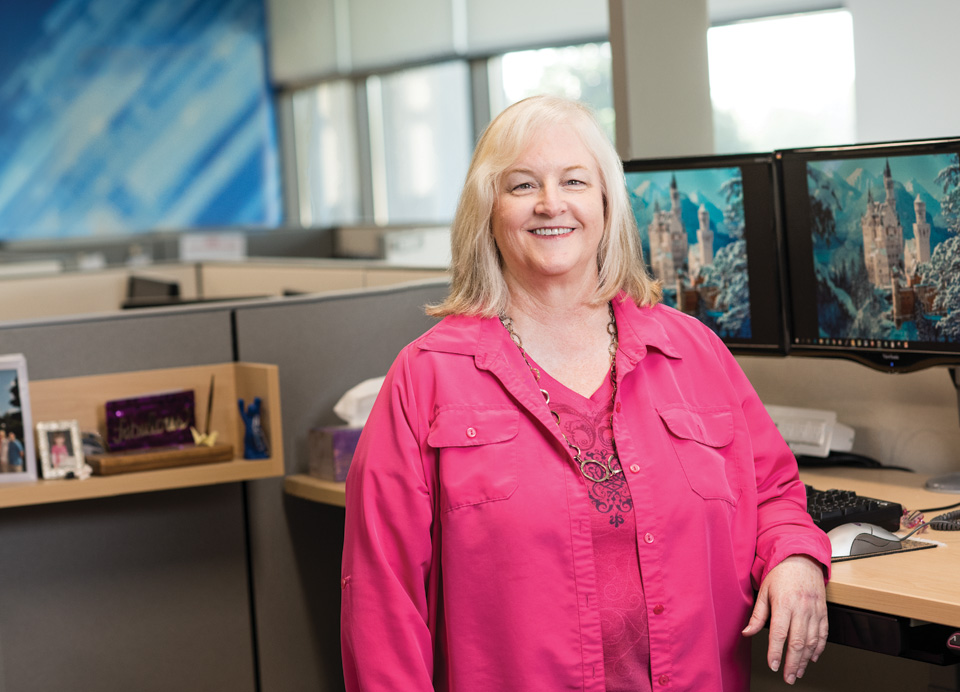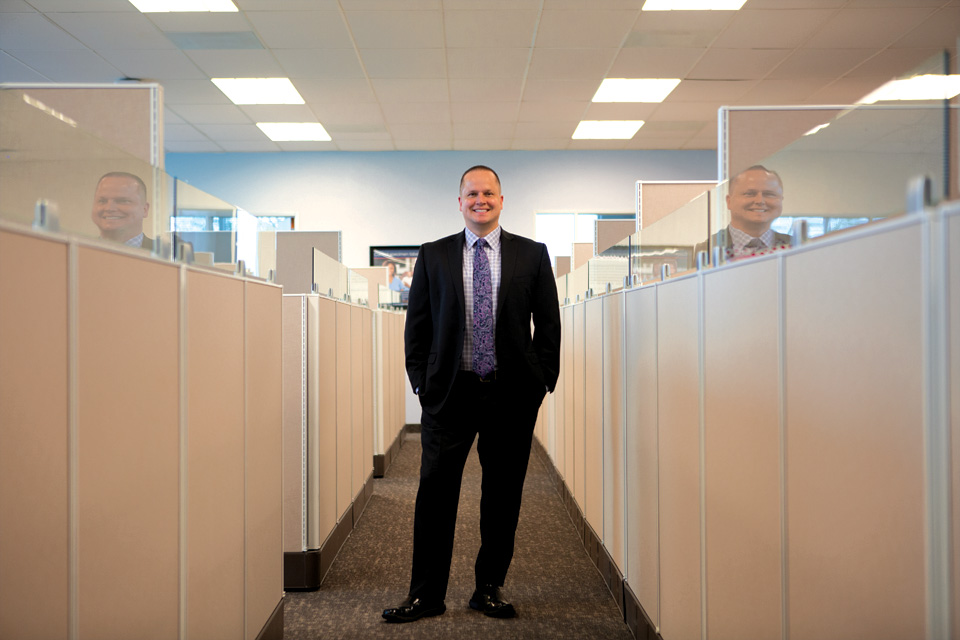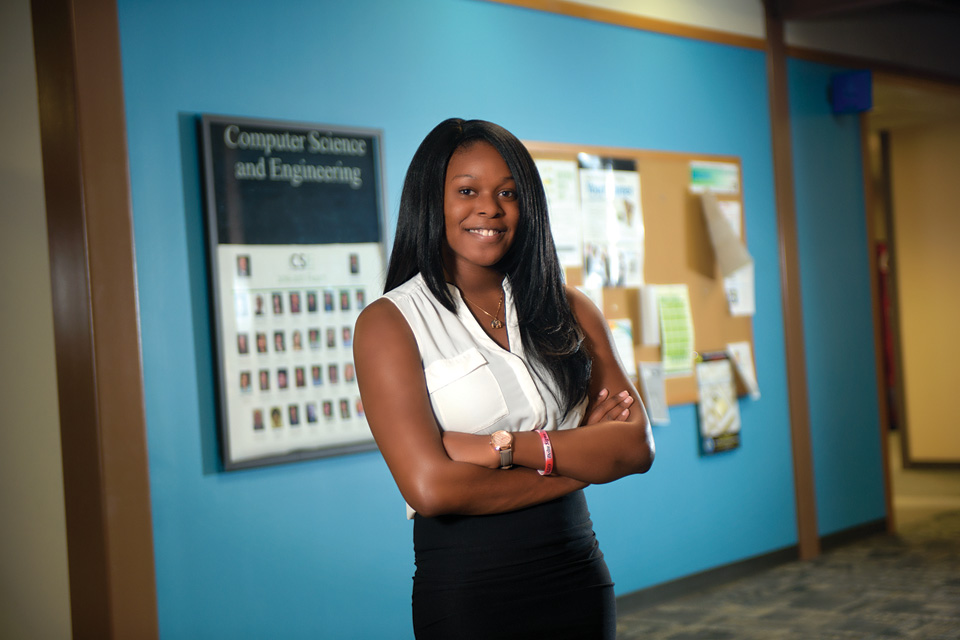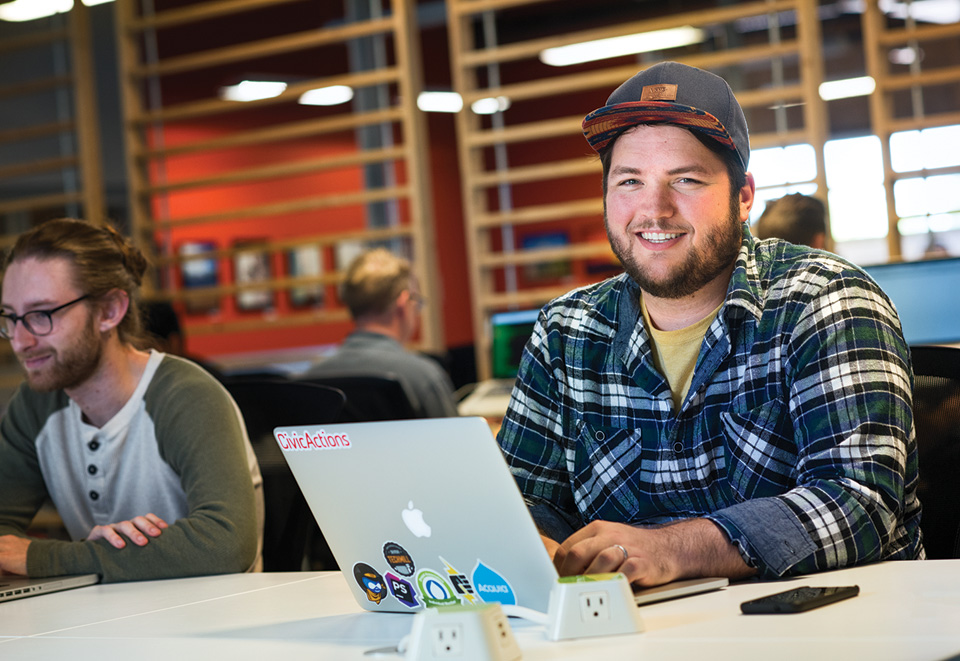athy Foster ('79 M.S.) has never struggled to find a job. As a computer scientist, she's embraced the ever-changing technology revolution to make computers useful for people.
Computing for the Future
Computer science alumni use innovation to solve problems and create new technologies.
November 30, 2017
K

Kathy Foster ('79 M.S.) (Photo by Ahna Hubnik)
Working at UNT's Computing Services Center in 1974, she began taking classes for a master's degree in computer science. Her office was in the science library and her duties included helping doctoral students create research questionnaires and run statistical analyses of the results, which would ultimately be published in dissertations.
"My entire career has been like that, a really cool blend of helping people and using technology to do it," says Foster, who today as a data analyst at Texas Instruments teaches colleagues about various database management systems. "I have the heart of a teacher, and computer science has been the perfect career for that and my interest in technology."
UNT's computer science and engineering program -- housed in one of the fastest growing colleges, the College of Engineering -- is one of the oldest computer science programs in Texas. Celebrating its 45th anniversary this year, the department has a long history of preparing graduates like Foster for careers in the computer science field. Many students go on to successful careers in computer programming and app development, digital information processing, game programming, hardware and software design, and information systems management.
In addition to offering undergraduate and graduate classes at UNT's 300-acre Discovery Park, the North Texas region's largest research park, the department offers a certificate in game programming and an executive master's in computer science with concentrations in data science and cybersecurity at UNT's New College at Frisco.
Database management
Foster credits her professors at UNT, especially Denis Conrady, for exposing her to databases.
"They broadened my perspective on what computers were capable of doing," she says.
In 1980, Foster took a position in administrative computing at Texas A&M University, where she learned IMS, a mainframe database management system that she still uses today.
"The experience at UNT gave me a firm foundation, a love of computers and the basis to apply whatever new technology came next," Foster says. "It's been easy to assimilate changes as they came along. As a computer scientist, you are constantly learning and adding to your skill sets if you want to survive and excel."
Foster, a member of UNT's Department of Computer Science and Engineering Industry Advisory Board, credits her IMS knowledge for getting her foot in the door at Texas Instruments in 1986. There she subsequently learned newer database management systems including DB2 and Oracle. Now, her work has come full-circle. She has spent the last three years focusing on IMS and DB2, the legacy mainframe systems many of her younger counterparts never learned. Foster's deep knowledge of multiple systems has helped her climb Texas Instruments' technical ladder.
"To be successful in this changing business, you have to have a solid understanding of the basis of the technology," Foster says, "then know how to use your resources, both human and technical."
Health care solutions

Greg Thurman ('98) (Photo by Adriana Salazar)
Like Foster, Greg Thurman ('98) says his UNT education provided a solid foundation for the rapidly changing profession.
After two years at UNT dabbling in psychology, electrical engineering and pre-law courses, Thurman took a computer programming class and found his niche.
He enjoyed programming's technical challenges and the problem solving required to find the unique answer.
"The things I learned in college were in a lot of ways theoretical," he says.
He also learned about how hard work pays off. Although he had a passion for computer science, as a student he worried he may not have the aptitude for the math and physics the degree required. He sought counsel from Albert Haddad, a visiting professor of computer science.
"Dr. Haddad told me that if I wanted to be a software developer, I needed to make a commitment to earn that degree," Thurman says. "Sometimes in life when people are blunt with you, it's best."
Thurman buckled down, spent many late nights in the computer and math labs, skipped some important events like his cousin's wedding, and ultimately earned his bachelor's degree while simultaneously working two or three jobs each semester to pay for college.
After graduation, he began working as a developer to create software for county governments, including Denton County's jail. Six years later, Thurman transitioned into the health care industry. He now oversees software development for Sonic Healthcare, a global company, as director of clinical information systems in the U.S.
"I am now focused on people -- developing high-performing teams that deliver world-class customer service and high- quality software development. I started my career working technically to solve problems programmatically and now I'm able to help shape the vision and the strategy of solutions," he says. "My technical background helps me pull the right resources together to solve the problem."
He says the industry today has a greater focus on user experience and data mining.
"We do more business intelligence now, to figure out how to let computers help us do things in more effective and efficient ways," he says.
Coding to advance
Web development

Tyseanah Spell ('16) (Photo by Gary Payne)
Computers have always been a part of Tyseanah Spell's ('16) life as a millennial. As a high school senior in Houston, she realized that she wanted to make computing her career and she chose to attend UNT to study computer engineering.
"I wanted to know why the computer was showing me what it was showing me and how everything worked," Spell says.
While she has always been a good student, she says one particular professor challenged her like no one ever had.
"Dr. Robin Pottathuparambil was the only person in my entire life to give me a C," Spell says. "He pushed me to work harder."
She also joined organizations at UNT -- the National Society of Black Engineers, the Society of Women Engineers and the NAACP -- that helped her learn about leadership and building relationships.
Her hard work paid off. While attending a College of Engineering career fair, she received two job offers before she had graduated. She accepted a position with L3 Technologies in Greenville as a software engineer, modernizing planes by updating them with the latest surveillance technology for U.S. government and military.
"I work a lot with coding, always trying to keep advancing current technologies," Spell says. "UNT gave me the background I needed to be successful in my job."
Web development
Department of Computer Science and Engineering
UNT's Department of Computer Science and Engineering, which celebrated its 45th anniversary this year, has grown to include 33 faculty, more than 1,100 undergraduate students, nearly 200 master's students and more than 100 doctoral students. Undergraduate programs include information technology, computer science and computer engineering, and graduate programs are offered in computer science and engineering. Today, the department is home to 15 research labs such as the Computer Systems Research Laboratory, Network Security Laboratory, the Smart Electronic System Laboratory and the Laboratory for Recreational Computing, which offers classes in game programming.
The department also includes three interdisciplinary research centers where faculty and students work to find solutions to some of society's pressing issues. The Center for Computational Epidemiology and Response Analysis applies computational science paradigms to the domain of public health, providing tools for epidemiologists and public health researchers. The Center for Information and Cyber Security, which earned the designation of "Center of Academic Excellence in Information Assurance Education" and "Center for Academic Excellence in Research" from the National Security Agency and Department of Homeland Security, places UNT among the top institutions in the nation in the field for computer security. And the Net-Centric Software and Systems Center, an NSF Industry/University Cooperative Research Center, focuses on the development of net-centric and cloud computing systems.

Kyle Taylor ('12) (Photo by Ahna Hubnik)
UNT's Department of Computer Science and Engineering, which celebrated its 45th anniversary this year, has grown to include 33 faculty, more than 1,100 undergraduate students, nearly 200 master's students and more than 100 doctoral students. Undergraduate programs include information technology, computer science and computer engineering, and graduate programs are offered in computer science and engineering. Today, the department is home to 15 research labs such as the Computer Systems Research Laboratory, Network Security Laboratory, the Smart Electronic System Laboratory and the Laboratory for Recreational Computing, which offers classes in game programming.
The department also includes three interdisciplinary research centers where faculty and students work to find solutions to some of society's pressing issues. The Center for Computational Epidemiology and Response Analysis applies computational science paradigms to the domain of public health, providing tools for epidemiologists and public health researchers. The Center for Information and Cyber Security, which earned the designation of "Center of Academic Excellence in Information Assurance Education" and "Center for Academic Excellence in Research" from the National Security Agency and Department of Homeland Security, places UNT among the top institutions in the nation in the field for computer security. And the Net-Centric Software and Systems Center, an NSF Industry/University Cooperative Research Center, focuses on the development of net-centric and cloud computing systems.